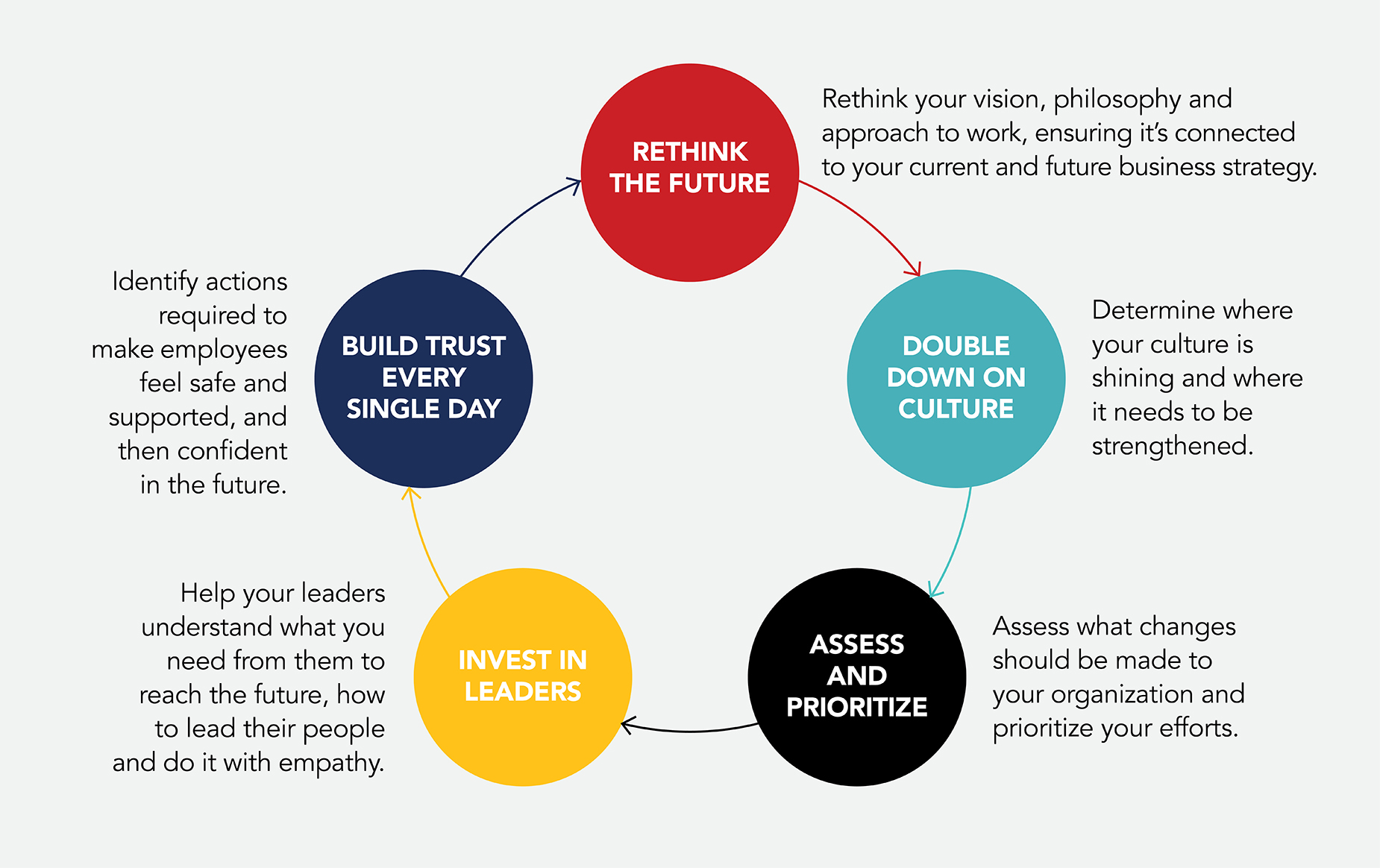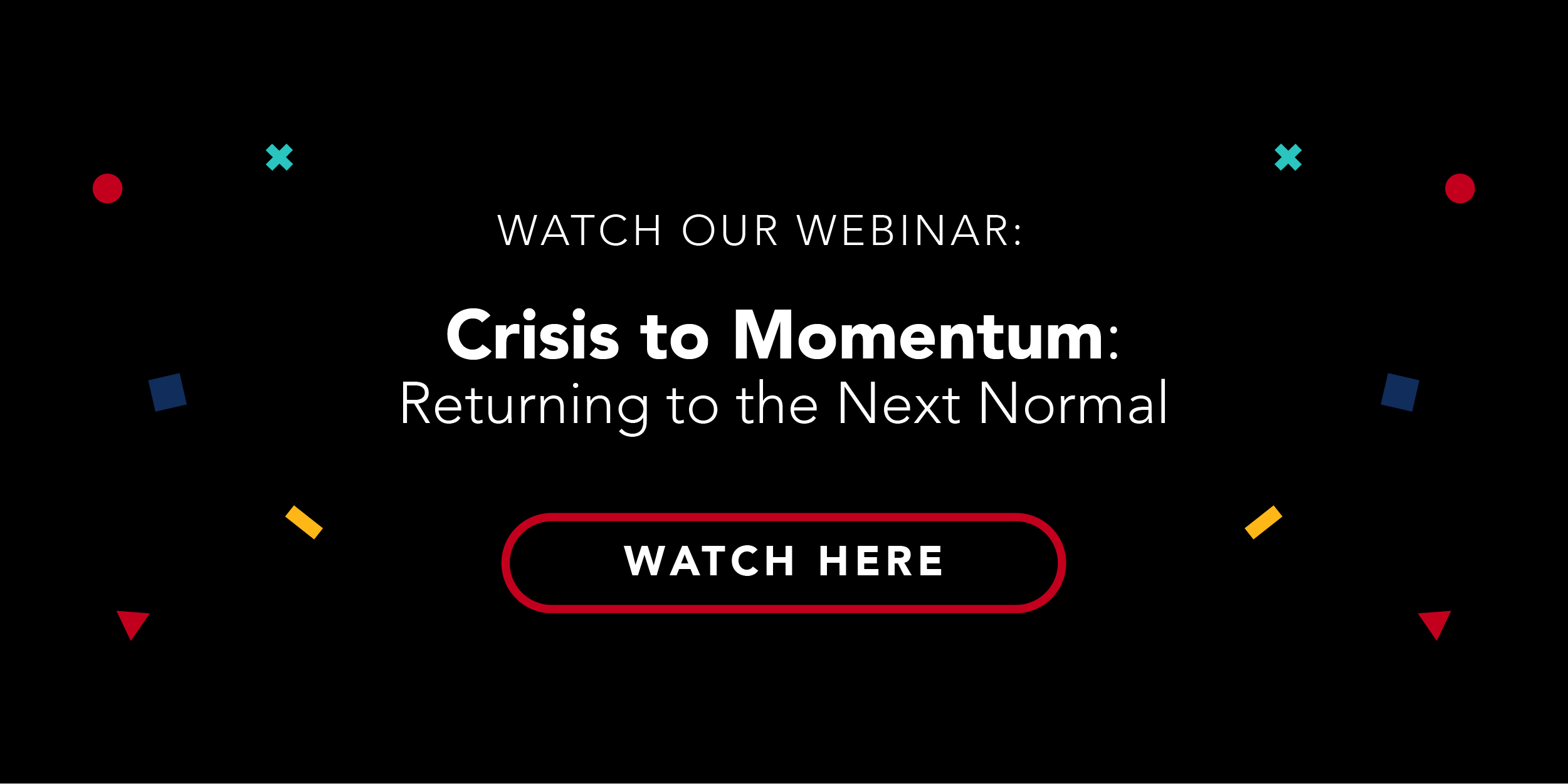Over the course of 2020, one thing has remained constant: change. COVID-19 transformed the world as we know it at an unprecedented rate. And as the year went on, it became more and more clear that there is no going back to normal. There is only going forward…into a very different world of work.
Leaders went from focusing first and foremost on the health and safety of their people, to quickly speeding up their digital transformation plans to support employees working from anywhere. It was a complex challenge that demanded careful thought and planning, but it lacked long-term thinking. What does the future employee experience look like? What do organizations need to do to recruit and retain top talent? What changes need to be made to culture and values to reflect new business models?
For many, these seismic shifts have not yet been addressed. Things like team structures, policies, workflows, processes, culture, leadership, and just about every aspect of the work experience might remain a question mark. But as the pace of change accelerates, leaders can’t afford to delay thinking about these impacts – they need to plan for what’s next, now.
In short, we need to continue to rethink the future of work and how organizations will need to change.
So how do you balance the need to ensure your employees are safe and productive and your business is secure while planning for the future? We have identified four external drivers that we believe will continue to transform the world of work in 2021 and beyond.
1. ORGANIZATIONS WILL BE VALUED “BEYOND SHAREHOLDERS”
In August 2019, the Business Roundtable made a stunning turnaround when the CEOs of America’s largest businesses acknowledged that all stakeholders – workers, communities, partners – were as valuable as their investor shareholders. And with the #1 driver of reputation among consumers right now being how organizations are taking care of their employees,1 the companies that followed suit are certainly seeing the benefits now. Take Microsoft for example. They are continuing to pay all vendor hourly service providers their regular pay during this period of reduced service needs.3
2. CONSUMER BEHAVIORS ARE CHANGING FAST
Customer spending and behaviors are changing rapidly with increases in some areas like groceries and massive decreases in other areas. 65% of consumers are currently postponing purchases and travel, and 52% intend for changes to their buying behaviors to continue.1 This means that companies need to go from putting the consumer first to becoming consumer obsessed, to meet them where they are and where they will be in the future.
3. NEW CAPABILITIES, MINDSETS, AND CULTURE ARE HERE
From siloed roles to a flexible workforce. From ability to adaptability. From a culture of knowing to a culture of learning. From what you do to why you do it. Every organization is going to need to realign capabilities, mindsets and their cultures to the new world.
4. PURPOSE HAS PROVEN SUPREME
The connection between purpose and action has become very real during this crisis. Companies who are taking actions to ensure they are walking the talk and leading with purpose will be remembered, and those who don’t will likely suffer consequences. Airbnb is an example of a company who connected their purpose of belonging and connection both in rethinking their business model and in how CEO Brian Chesky treated the employees who were let go. He led with transparency, empathy and compassion, stating: “We have looked across severance, equity, healthcare and job support and done our best to treat everyone in a compassionate and thoughtful way.”4
The implications and weight that these drivers carry are already having an enormous impact on organizations, and things will never be the same. Based on this, we developed five areas that will help you to go from jumping from crisis to crisis, to creating forward momentum.

For more details, listen to our mini-webinar series on the topics here. This is just the start of the conversation. Watch this space for more information as we continue to unpack the future of work in 2021. In the meantime, reach out…we are here to help.
1 “COVID-19 Mindset: How Pandemic Times are Shaping Global Consumers”, Fleishman Hillard: https://fleishmanhillard.com/wp-content/uploads/meta/resource-file/2020/covid-19-mindset-how-pandemic-times-are-shaping-global-consumers-1586478116.pdf
2 Woodward, Aylin. “The COVID-19 pandemic could last for 2 years, according to US experts.” World Economic Forum, https://www.weforum.org/agenda/2020/05/coronavirus-pandemic-last-2-years/
3 Hyder, Shama. “Coronavirus Champions: A Running List of Brands Getting it Right.” Forbes, https://www.forbes.com/sites/shamahyder/2020/03/15/coronavirus-champions-a-running-list-of-brands-getting-it-right/#3763f3725815https://www.nytimes.com/2020/05/07/realestate/quiet-silent-apartment-home-workout-coronavirus-exercise.html?searchResultPosition=3
4 Kelly, Jack. “Airbnb Lays off 25% of its Employees: CEO Brian Chesky Gives a Master Class in Empathy and Compassion.” Forbes, https://www.forbes.com/sites/jackkelly/2020/05/06/airbnb-lays-off-25-of-its-employees-ceo-brian-chesky-gives-a-master-class-in-empathy-and-compassion/#6ef771beee30
